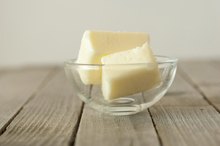What does fact checked mean?
At Healthfully, we strive to deliver objective content that is accurate and up-to-date. Our team periodically reviews articles in order to ensure content quality. The sources cited below consist of evidence from peer-reviewed journals, prominent medical organizations, academic associations, and government data.
- "Nutrition and Cancer;" Intakes of Vitamin A, C and E; 2010
- "Nutrition and Cancer;" Intakes of Vitamin A, C and E; 2010
- Linus Pauling Institute: Vitamin K
The information contained on this site is for informational purposes only, and should not be used as a substitute for the advice of a professional health care provider. Please check with the appropriate physician regarding health questions and concerns. Although we strive to deliver accurate and up-to-date information, no guarantee to that effect is made.
Vitamins in Butter
When you think about getting vitamins from food, the last source you think of is butter. We are indoctrinated into thinking that butter holds no beneficial qualities beyond taste. Butter does more than make green vegetables taste better. Along with the fat and minerals, butter contains vitamins that are necessary for health.
Vitamin A
Nearly every bodily function requires Vitamin A, in some capacity, to work properly. Vitamin A is also a strong antioxidant vitamin, which helps fight off many diseases, including cancer. The 2010 issue of "Nutrition and Cancer" reports that a low intake of Vitamin A is associated with an increased risk of cervical cancer 2. If you eat butter, you contribute to your Vitamin A intake. One tbsp. of butter contains 350 IU of Vitamin A, or 7 percent of the recommended daily value, according to the U.S. Department of Agriculture 1. Remember that butter contains a high amount of fat, so while 1 tbsp. will contribute to your Vitamin A intake, you don't want to increase your butter intake just to get your daily allowance of Vitamin A.
- Nearly every bodily function requires Vitamin A, in some capacity, to work properly.
- Vitamin A is also a strong antioxidant vitamin, which helps fight off many diseases, including cancer.
Vitamin E
Nutrition Facts for Unsalted Butter
Learn More
Vitamin E is another antioxidant vitamin that works together with Vitamin A to fight off damage causing molecules in the body. The amount of Vitamin E in 1 tbsp. of butter is only 0.3 mg, or 2 percent of the recommended daily intake. Just as with Vitamin A, you don't want to up your butter intake to increase your Vitamin E intake. However, one benefit of getting Vitamin E from butter is that Vitamin E requires fat in the digestive tract to be absorbed, which means the Vitamin E in butter is Vitamin E that is easily absorbed into the system.
- Vitamin E is another antioxidant vitamin that works together with Vitamin A to fight off damage causing molecules in the body.
- However, one benefit of getting Vitamin E from butter is that Vitamin E requires fat in the digestive tract to be absorbed, which means the Vitamin E in butter is Vitamin E that is easily absorbed into the system.
Vitamin K
Vitamin K doesn't receive too many accolades and awards, but it is a vitamin that is necessary for overall body health. Vitamin K's major role is to make sure the blood clots properly--if it didn't, we would bleed to death. The Linus Pauling Institute reports that along with clotting the blood, Vitamin K has a role in healthy bone production, as well as the production and protection of cells within the body 3. One tbsp. of butter contains 1 mcg of Vitamin K, or 1 percent of the recommended daily intake.
- Vitamin K doesn't receive too many accolades and awards, but it is a vitamin that is necessary for overall body health.
B Vitamins
Diabetics and Butter
Learn More
One tbsp. of butter also contains trace amounts of various B vitamins, such as:
- folate
- Vitamin B12
- pantothenic acid
- thiamin
- riboflavin
- niacin
The B vitamins all assist in metabolism, helping the body convert food into energy. They also are important to the production of red blood cells, according to the NIH.
Related Articles
References
- U.S. Department of Agriculture: Nutritional Data of Butter
- "Nutrition and Cancer;" Intakes of Vitamin A, C and E; 2010
- Linus Pauling Institute: Vitamin K
- Gast GC, De roos NM, Sluijs I, et al. A high menaquinone intake reduces the incidence of coronary heart disease. Nutr Metab Cardiovasc Dis. 2009;19(7):504-10. doi:10.1016/j.numecd.2008.10.004
- Rees K, Guraewal S, Wong YL, et al. Is vitamin K consumption associated with cardio-metabolic disorders? A systematic review. Maturitas. 2010;67(2):121-8. doi:10.1016/j.maturitas.2010.05.006
- Cockayne S, Adamson J, Lanham-new S, Shearer MJ, Gilbody S, Torgerson DJ. Vitamin K and the prevention of fractures: systematic review and meta-analysis of randomized controlled trials. Arch Intern Med. 2006;166(12):1256-61. doi:10.1001/archinte.166.12.1256
- Iwamoto J, Takeda T, Sato Y. Role of vitamin K2 in the treatment of postmenopausal osteoporosis. Curr Drug Saf. 2006;1(1):87-97. doi:10.2174/157488606775252629
- Zhong JH, Li H, Li LQ, et al. Adjuvant therapy options following curative treatment of hepatocellular carcinoma: a systematic review of randomized trials. Eur J Surg Oncol. 2012;38(4):286-95. doi:10.1016/j.ejso.2012.01.006
- Zwakenberg SR, Den braver NR, Engelen AIP, et al. Vitamin K intake and all-cause and cause specific mortality. Clin Nutr. 2017;36(5):1294-1300. doi:10.1016/j.clnu.2016.08.017
- Koitaya N, Ezaki J, Nishimuta M, Yamauchi J, Hashizume E, Morishita K, Miyachi M, Sasaki S, Ishimi Y. Effect of Low Dose Vitamin K2 (MK-4) Supplementation on Bio-Indices in Postmenopausal Japanese Women. J Nutr Sci Vitaminol (Tokyo). 2009 Feb;55(1):15-21.
Writer Bio
A certified nutritionist who majored in health, fitness and nutrition, Traci Vandermark has been writing articles in her specialty fields since 1998. Her articles have appeared both online and in print for publications such as Simple Abundance, "Catskill Country Magazine," "Birds and Blooms," "Cappers" and "Country Discoveries."









